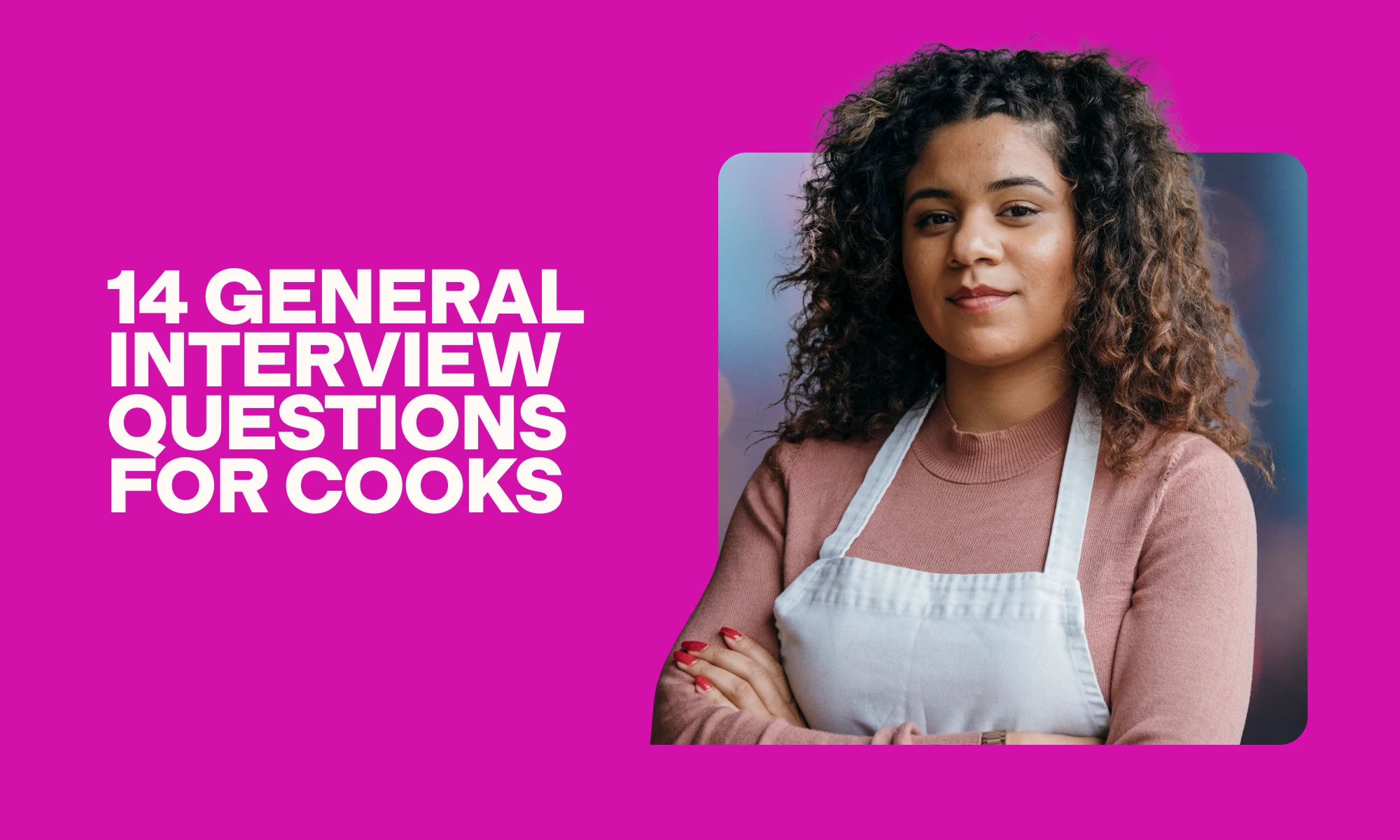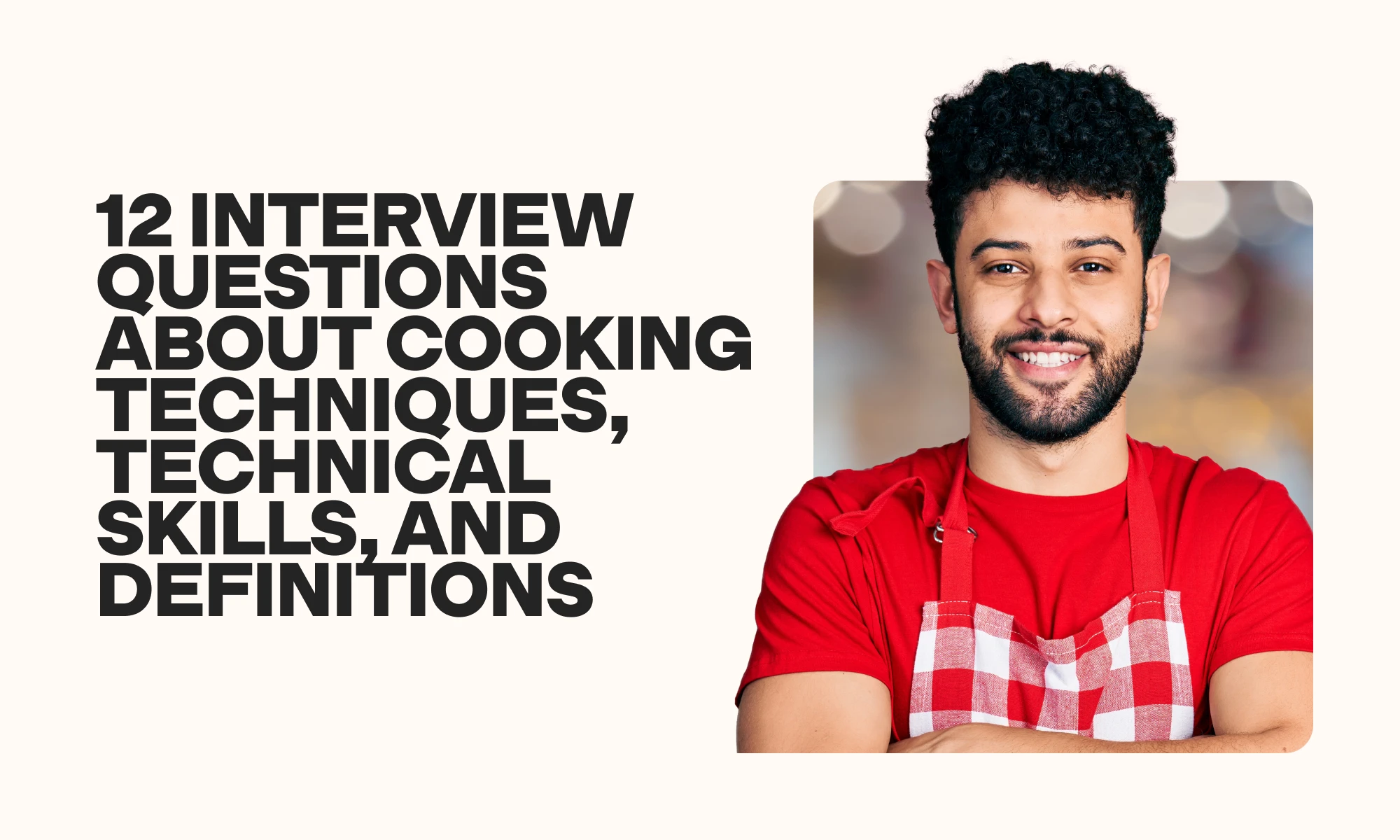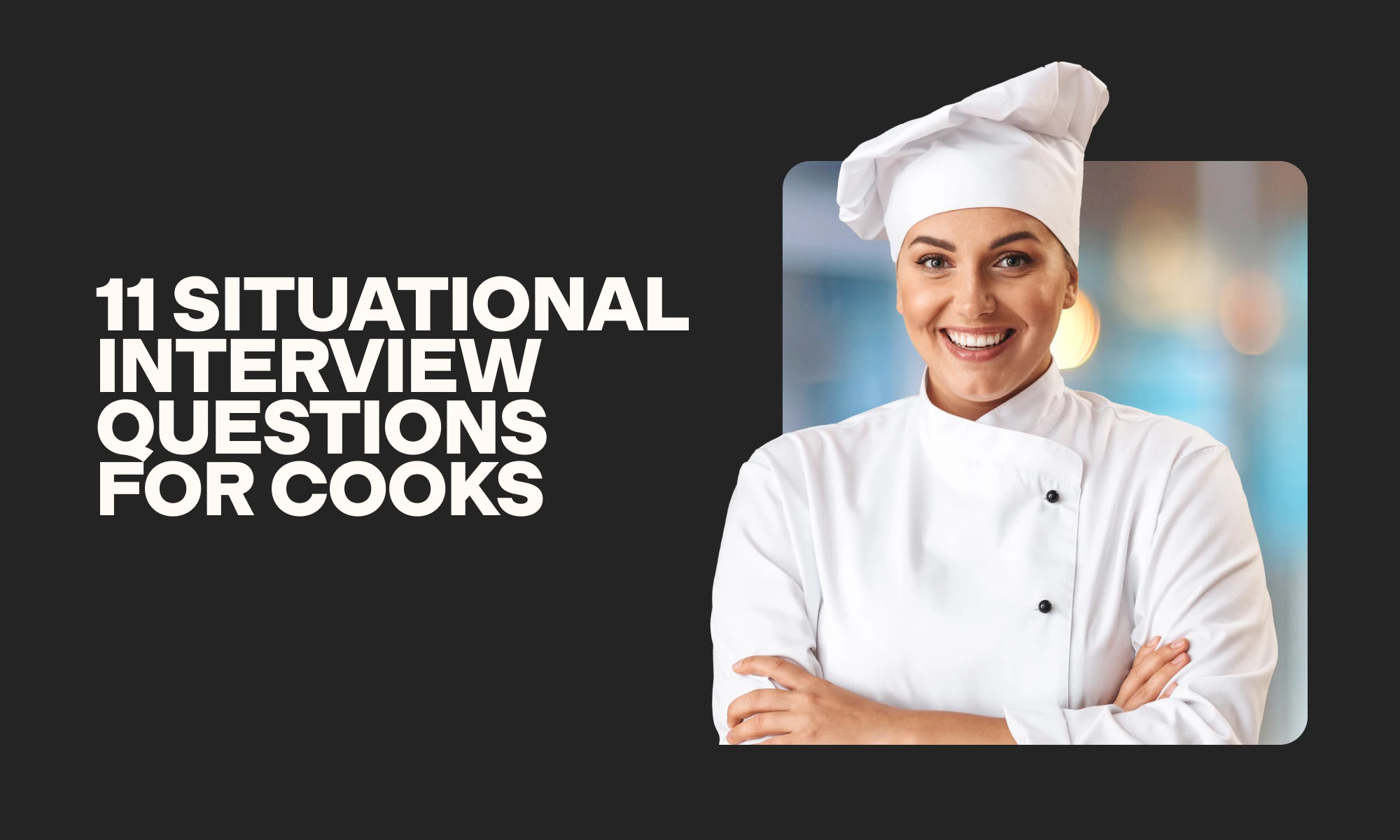37 interview questions to use when hiring a cook
Find the best culinary experts with skills assessments
How can you be confident that the next cook you hire has the cooking skills required to serve up delicious food that keeps customers coming back to your restaurant?
It’s a challenge, but there are ways to hire exceptional talent with the right cooking techniques and skills.
Using the right interview questions for cooks is one of the steps that can reduce the complexity of hiring a top candidate, as is using a Cooking Techniques skills test.
While using a cooking techniques skills assessment isn’t too difficult, you may wonder where you can find the right interview questions for cook roles.
The answer? Right here, in this article.
Take a look at the 37 interview questions for cook roles just below.
Table of contents
- 14 general interview questions for cooks to ask your applicants
- 5 general interview questions and sample answers for cook roles
- 12 interview questions about cooking techniques, technical skills, and definitions
- 5 interview questions and sample answers about cooking techniques, technical skills, and definitions
- 11 situational interview questions for cooks
- 5 situational interview questions and sample answers for cook roles
- When should you use these interview questions to assess cooks during the recruitment process?
- Why use our skills test on cooking techniques in your hiring process?
- Hire culinary experts with skills assessments and the right interview questions
14 general interview questions for cooks to ask your applicants
Ask your interviewees some of these 14 general interview questions for cooks to review their culinary skills and hire top chefs.
What motivates you to work on your cooking techniques and improve?
Why did you choose to pursue a career as a cook?
Why have you applied for our line cook role?
Name your strongest skills as a cook.
Name your weakest skills as a cook.
Which dish do you enjoy cooking the most?
Which cooking certifications have you obtained?
Why have you chosen to leave your current role?
Which chefs inspire you to cook new dishes?
Which skills are essential for working as a cook?
Which soft skills are essential for working as a cook?
Which career steps do you hope to have achieved in five years as a cook?
How do you stay updated with the health code changes in this location?
Have you ever worked weekend shifts as a cook?
5 general interview questions and sample answers for cook roles
Review your applicants’ responses with the help of our sample answers to the five most important general interview questions for cooks below.
1. Why did you choose to pursue a career as a cook?
Ask this general interview question to set the tone of the interview and determine how passionate your applicants are about working as cooks.
Applicants may have been passionate about cooking from an early age. They may have had to cook for others and transformed their passion into a career. Look for applicants who are excited about cooking and enjoy it.
2. Which skills are essential for working as a cook?
Having the right cooking technique knowledge is critical for working as a cook. Candidates must also understand all key food safety best practices, as well as the importance of maintaining impeccable cleanliness when cooking.
Do your applicants understand why these cooking skills are essential? Can they demonstrate how they have used these skills in their careers?
3. Which soft skills are essential for working as a cook?
Plenty of soft skills are vital for working as a cook, including communication, attention to detail, motivation, and time management.
Have your applicants used these skills to enhance the quality of their output, and do they understand why these abilities are so vital in cooking? You can also use our Motivation, Attention to Detail, and Time Management tests to evaluate applicants’ soft skills.
4. Name your strongest skills as a cook.
From customer service to communication, there are many skills your applicants may list that help them complete their chef work. Review your applicants’ strongest qualities to determine whether they would be an asset to your team.
5. Name your weakest skills as a cook.
From attention to detail to implementing feedback as a cook, there are many skills your applicants may mention when responding to this interview question.
No applicant will be perfect. The important thing is that they have methods for working on their weaker skills and improving them. Whether they practice at home, put in extra hours, read books, or use other methods, your candidates must be working on developing their skills.
This interview question will help you determine whether they’re motivated to improve and see what specific steps they’ve taken to achieve that.
Have you tried our soft skills assessments?
Level up your recruiting with soft skills assessments from TestGorilla.
The best insights on HR and recruitment, delivered to your inbox.
Biweekly updates. No spam. Unsubscribe any time.
12 interview questions about cooking techniques, technical skills, and definitions
Ask your top talent some of these 12 interview questions about cooking techniques, technical skills, and knowledge to review your chef applicants’ cooking abilities more closely.
Describe your experience working for diners in a restaurant.
Explain what broiling is.
Define what braising is.
Explain what roasting is.
What is baking?
Describe your baking experience. Which challenges have you faced when baking?
Describe your sauce-making experience.
What does “al-dente” mean when cooking?
How has your formal training prepared you for working as a line cook?
What are your favorite baked dishes to make?
How familiar are you with local health codes?
Explain the difference between rare, medium rare, and well done.
5 interview questions and sample answers about cooking techniques, technical skills, and definitions
Appraise your applicants’ cooking responses five of the most important interview questions related to cooking skills with the sample answers provided below.
1. Explain what broiling is.
Can your applicants explain that broiling is a cooking technique that uses radiant heat similarly to grilling, but the heat is directed from above? Are they aware that broiling is ideal for cooking meat or vegetables and that the direct heat increases the cooking speed?
2. Define what braising is.
Applicants who have practiced using this technique should be able to explain the steps involved in braising food.
Do your applicants know that braising is a cooking method that involves using dry and wet heat? Can they explain that the process involves browning the food on high temperature and then simmering it in a cooking liquid inside a pot?
3. What does “al dente” mean when cooking?
Your candidates should know that “al dente” is an Italian phrase that means “to the tooth.”
Applicants may explain that chefs use this phrase to describe the perfect pasta consistency, which is achieved after cooking it for a short amount of time. Skilled applicants with expert culinary and linguistic skills will also know that “molto al dente” refers to undercooked pasta.
4. How familiar are you with local health codes?
Restaurants undergo health inspections regularly, so your applicants must understand your location’s health codes (such as cleanliness rules and kitchen safety). It’s also essential that your applicants explain how they adhere to health codes and why they are crucial for chefs.
If your applicants are not entirely up to date, ensure they show a willingness to quickly learn more about health codes.
5. Explain the difference between rare, medium rare, and well done.
Candidates should know that rare, medium rare, and well done refer to the tenderness of a steak when it’s cooked.
Each of these textures will depend on the cooking time and the temperature at which it is cooked. Your candidates may also mention that nutrient levels remain the same despite the difference in the texture but that the flavor is different.
11 situational interview questions for cooks
Ask your potential new chef some of these 11 situational interview questions to gauge how they manage particularly stressful or challenging situations in the kitchen.
Which method do you use to stay calm when working under pressure?
Have you ever disagreed with a supervising chef? How did you address the disagreement?
How would you handle your duties working in an extremely busy restaurant?
Have you ever had a customer return a dish? How did you handle this situation?
Describe a time you assisted a co-worker in the kitchen.
What was your most difficult situation as a cook? How did you handle it?
How do you balance preparing perfect dishes with sending food out on time?
Have you ever worked in a large team of cooks? Describe your experience.
Have you ever lacked the right ingredients for a dish? How did you handle this?
How do you cope during the lunchtime rush hour if your team is understaffed?
How do you prepare workstations and different zones to uphold safety regulations in the kitchen?
5 situational interview questions and sample answers for cook roles
Evaluate your applicants’ responses by checking the answers to the five most important situational interview questions for cooks.
Our sample answers will help you gauge the depth of your candidates’ knowledge with ease.
1, How do you balance preparing perfect dishes with sending food out on time?
Interviewees should understand that ensuring the customer’s dishes are well-prepared is a priority.
When balancing food preparation and punctuality, food preparation is more critical to ensure the customer is satisfied. In this case, checking the specifications for the order is critical.
For example, making sure they adhere to all preferences and allergy-related specifications for a customer’s dish is critical for cooks.
2. Have you ever had a customer return a dish? How did you handle this situation?
When a customer returns a dish or criticizes the food quality, your cook must understand how to handle the criticism and resolve the issue.
Can your candidates explain that acknowledging the complaint and taking the right steps to rectify the criticism are two crucial steps in this situation? Are they aware that being courteous when handling cases like these is also vital?
3. Which method do you use to remain calm when working under pressure?
There are plenty of situations when your cooks must remain calm under pressure in the kitchen.
Can your candidate outline a few methods they would use in your role to stay calm? They may use problem-solving skills to address complaints in the kitchen or attention to detail to get the dishes right despite working under pressure.
Candidates should be able to outline a situation where they’ve used these skills and achieved success. You can assess these skills using our Problem-Solving or Attention to Detail skills tests.
4. How would you handle your duties working in an extremely busy restaurant?
What helps cooks handle duties in an extremely busy restaurant are the right skills and good planning abilities.
Does your candidate understand that strong teamwork skills are instrumental for successfully handling their tasks? Are they aware that planning can help handle lunchtime or dinnertime rush hours?
For instance, by planning in advance how to replace an absent staff member, candidates may find it easier to manage their duties in a busy restaurant.
5. How do you prepare workstations and different zones to uphold safety regulations in the kitchen?
Cooks must be able to meticulously follow kitchen safety procedures, which is why knowing all the details is essential. For example, knowing that the refrigerator’s temperature must be set correctly is critical. Your candidate should also know that sanitizing equipment is fundamental, as is handwashing and washing the food.
Applicants may also explain that preparing workstations and keeping them clean is critical, as is avoiding any cross contamination between different zones.
When should you use these interview questions to assess cooks during the recruitment process?
The perfect time to use these interview questions for cooks is after you’ve asked applicants to complete a Cooking Techniques skills test. This way, you’ll only spend time interviewing candidates who have the necessary knowledge of cooking techniques and not waste time with unqualified applicants.
On top of that, skills test results can help you come up with additional questions during the interview phase.
Why use our skills test on cooking techniques in your hiring process?
Our Cooking Techniques skills test is the best option to assess various sub-skills related to cooking. From cooking with dry heat to frying to cooking with moist heat and combination cooking, you can assess your candidates’ knowledge of different techniques before you interview them.
Skills tests such as this one help you to hire an exceptional cook without unconscious bias impacting the diversity of your team and distinguish between two exceptionally skilled cooks.
We advise you to create a skills assessment where you combine this test with a few others to gain an in-depth understanding of your applicants’ skills and knowledge.
With TestGorilla, you can combine up to five tests in a single assessment and send it to all applicants to easily shortlist the best ones to interview.
Hire culinary experts with skills assessments and the right interview questions
Now that you know how to hire a top cook for your restaurant or organization, you’re fully prepared to begin the recruitment process.
With our interview questions for cooks, you can easily interview and appraise your candidates’ technical knowledge, expertise, and ability to handle tricky situations.
Remember to use our Cooking Techniques skills test before you interview applicants. This will also help you create a training course that’s tailored to the needs of your new hire, because you’ll be able to use skills test results as a benchmark.
Hire the best culinary experts with skills tests and the right selection of interview questions for cooks and continue delighting your customers.
You've scrolled this far
Why not try TestGorilla for free, and see what happens when you put skills first.























